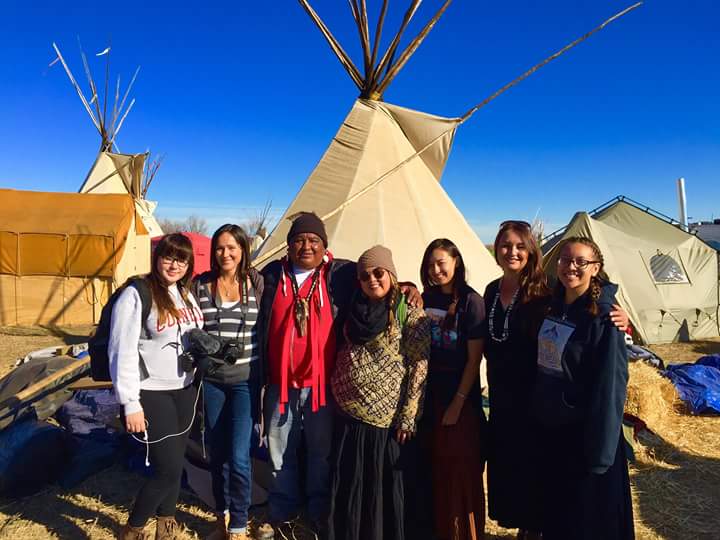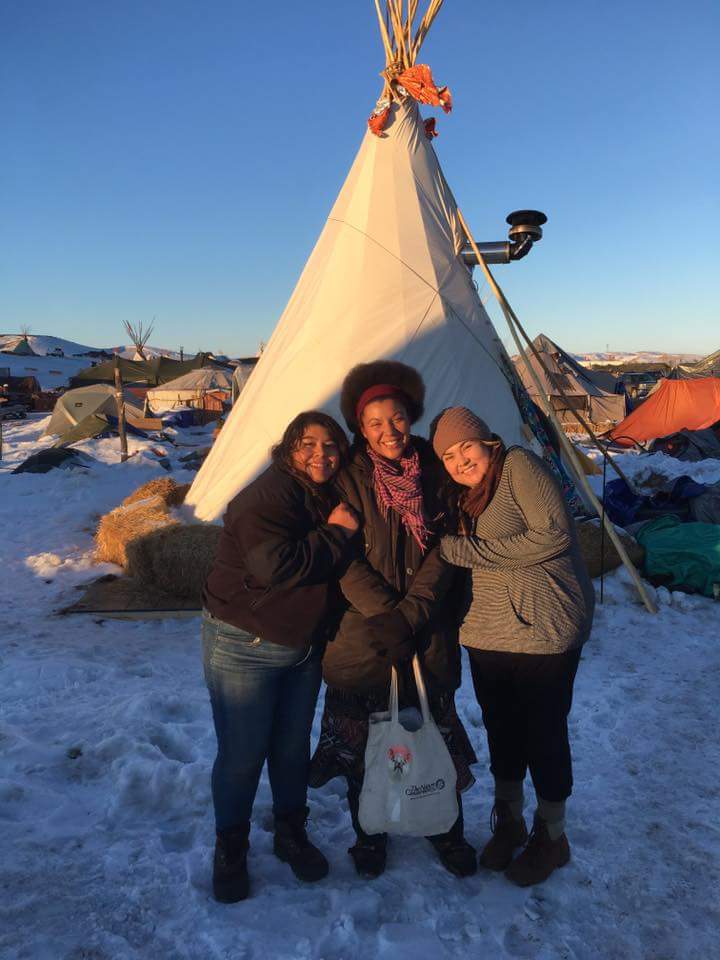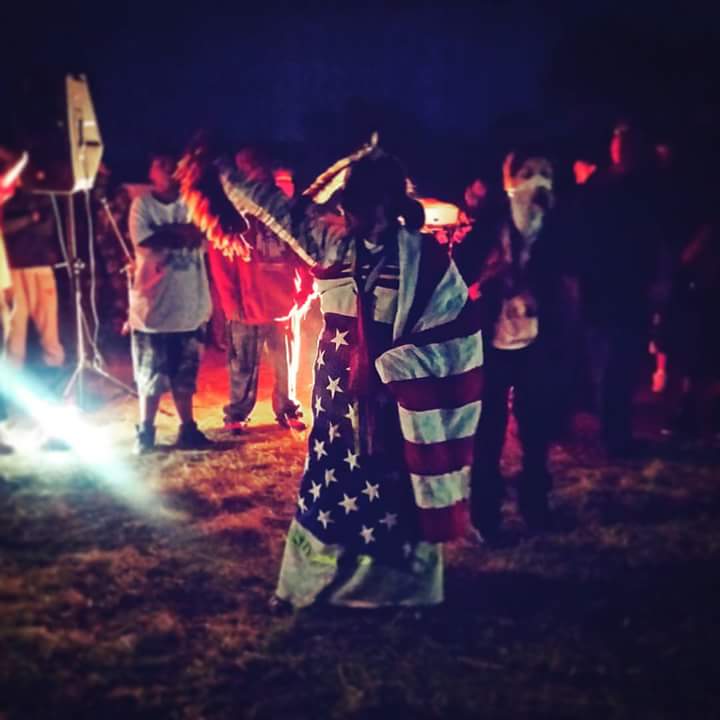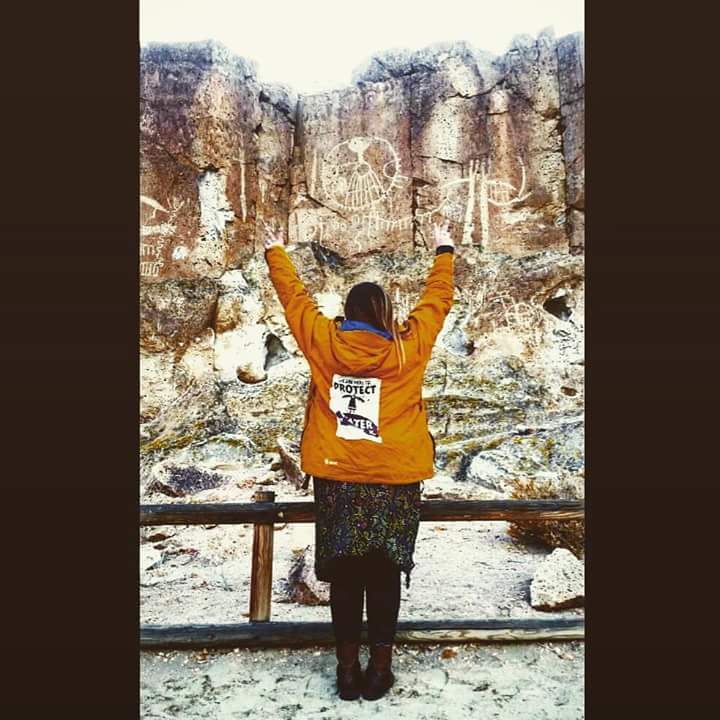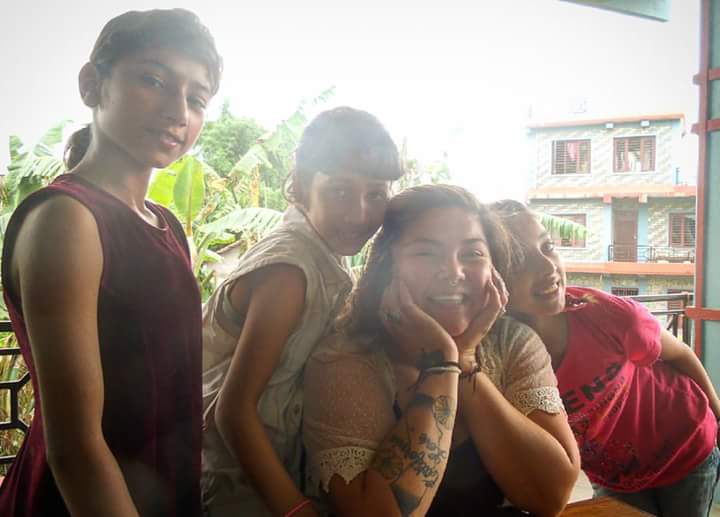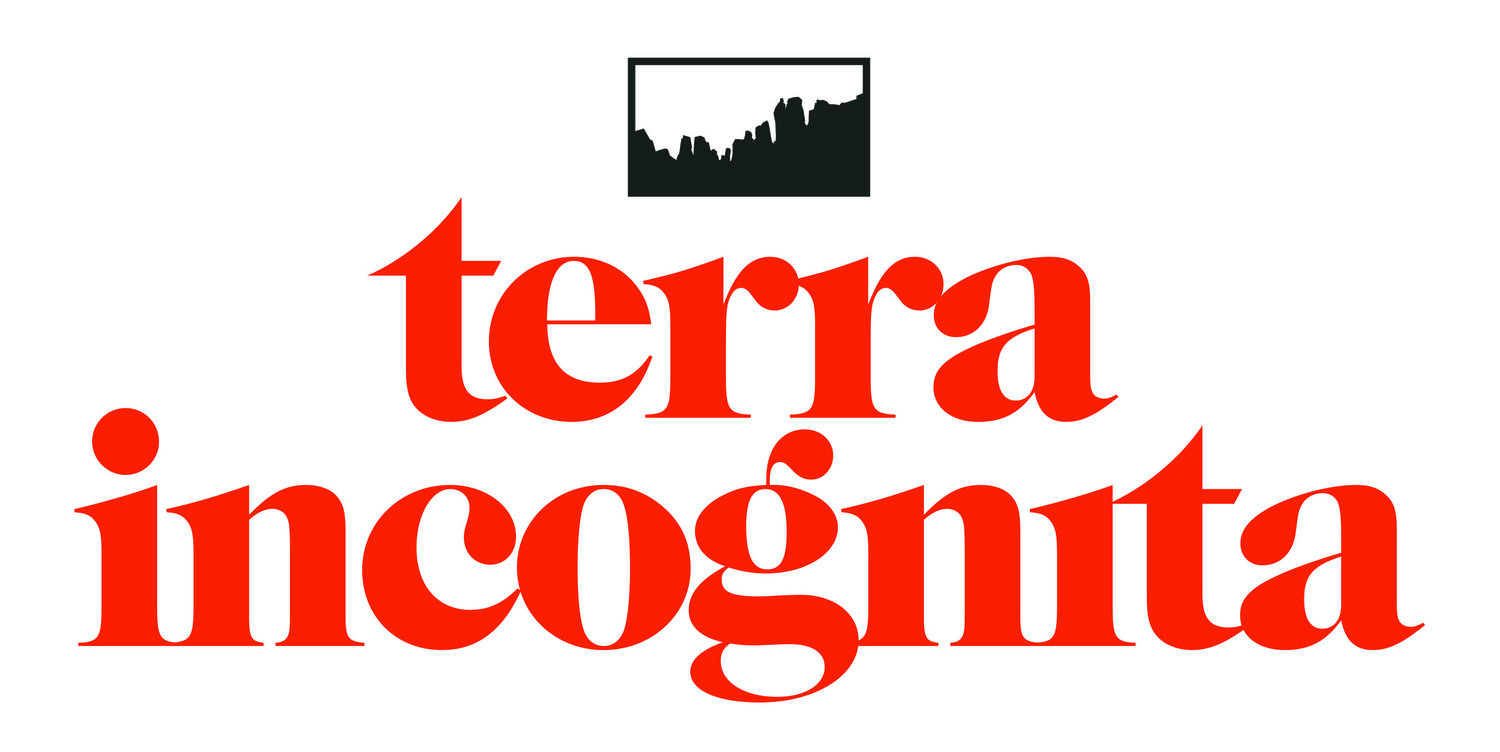The Future is Uncertain, but There is Hope: An Interview With Jolie Varela
Published May 11, 2017
Last December, police forced the Standing Rock water protectors to leave under ludicrous reasons, one being for their “health,” because the camps were situated on a flood plain, meaning a possible flood could occur. Police touted concern for civilian “safety,” though the police were not too concerned for their health and safety as they shot rubber bullets at children, women’s vaginas, the backs of people’s heads, spraying tear gas as liberally as Lysol in a Midwest suburban kitchen, and blasting hordes of water protectors – people, innocent people, the people who left their jobs and stability to fight for our world, the doctors, lawyers, construction workers, teachers, restaurant servers, bike shop owners, enduring freezing water being pumped out of cannons. These people braving freezing conditions and getting doused in immobilizing water, all the while chanting “water not oil.”
At times water protectors would walk up to a line of police and shake their hands. Some officers burst into tears because they knew how wrong they were to be standing there
fully militarized,
reinforcing the rigged game,
a line of American puppets.
Now we have Trump, our vindictive demagogue, kissing James Comey goodbye. Politico writer, Elizabeth Drew asks, “Ok, NOW is it Watergate?” Already having swiftly fired Former Acting Attorney General, Sally Yates, after she stood by her decision to instruct Justice Department lawyers not to defend Drumpf’s travel ban, we can only hope that, like Nixon, Drumpf McFuckFace leaves office. In the meantime, the fight for true justice and equality marches on and we see this in 30-year-old Jolie Varela, of Bishop, California, a daughter of the Paiute Tribe. Varela fought at Standing Rock and brought her torch home to keep the fire burning.
You can't help, but get sucked into a conversation with Varela. You won't be without laughter or intense mind-wanderings. She tells stories like nobody's business, and in her movements, hand gestures, and welcoming energy, she ushers you into the memory and you feel like you were there.
The fight for water rights is one that does not get talked about often in mainstream media, but it is a fight that is still going strong. There are camps of water protectors in Florida, Virginia, and Iowa, to name a few. The work is not over. In this interview, Varela generously offers her thoughts on colonization, capitalism, harmony, healing, and hope.
You are working on a Cultural Revitalization project for the Native peoples of Owens Valley in California. What inspired this?
I had always known that Bishop was a well-known area for climbing, fishing and many other outdoor sports. I grew up on the reservation and besides fishing I never saw any Natives out doing these things and as I got older I began to realize that these were not sports our parents could afford. I can't speak for everybody, but I know my parent's struggled to put food on the table and didn't have the time or money to do these activities with us. It hit me that these are sports of privilege. As Native people we are the original stewards of this land and we should be out enjoying and connecting with it regardless of the cost. The Cultural Revitalization program will promote health through outdoor adventure but also incorporate the Paiute language and tradition into all activities we do.
Can you talk about your childhood and your upbringing?
First, I want to express my love and gratitude to my mother and my stepfather. I know that they struggled to pay the bills and I can't imagine the helplessness a parent might feel when they aren't able to do so. My biological father is Tule River Yokut and I have not seen him or spoken to him in over 10 years. I'm not sure exactly how many children he has, but I do know five of my sisters. My parents struggled with addiction as many people on the reservation do. My older brother and I went to live with our grandmother in the city for some time until our mother overcame her addictions. My grandmother taught me how to read and I think I can blame her for being outspoken. I got my mother's big heart and one day I hope to be half the woman she is. My stepfather is the hardest working man I know and also the only father I've ever known. My childhood was not easy at all, but I always knew love and I'm grateful to be the woman I am today because of it.
Who were your biggest influences for your philosophy and life path?
Always the women in my life, my grandmother and my mother.
You’ve done a fair bit of traveling. Can you talk about your experiences while traveling? What you have learned?
Traveling has been so amazing and eye opening for me. The first time I left the country I went on my own all the way to Sri Lanka, I remember landing and thinking "I'm just a Paiute girl from the Owens Valley, what am I doing?" My first volunteer trip I worked in a shelter for disabled women and children. It was very scary and I didn't know if I would be able to do it, but it was there where I realized my own strength. I stayed and it was such a beautiful experience. I've worked in other countries in orphanages and shelters and I feel so connected to these children. I was in Nepal last year for two months and I worked in an orphanage with about 17 young girls. They were so bright and they loved school so much. I came at a time where they didn't know how they would pay school fees or even get money for food. My community really came through and we were able to raise money for food, new school clothes, and even a water filtration system so the girls didn't have to haul their water anymore. Through traveling I've learned just how tough I really am. My heart has also been touched by these children because no matter what their circumstance they are able to smile in the face of it all.
When did you first realize injustice?
At a very young age, I can't pin point the exact moment, but I know I was a little girl.
What is your relationship with nature?
I can't really explain my relationship to nature, but I'll try. I was hiking up near Blue Lake a few years back and I found grinding stones, I thought of my ancestors grinding pine nuts and fishing from the creeks. I feel very connected to this land and I feel a great sense of pride when I think of how my ancestors loved and lived in harmony with this land since time immemorial.
What is your understanding of love?
My understanding of love changes every day. I feel immense love for the land, my ancestors, for all my people. As far as being in love with someone goes I am now very cautious and I have very different views than I did two years ago. I think when you love yourself the rest will come.
What are your thoughts on capitalism?
Capitalism is no friend to Indigenous peoples. It's the cause of American Indian genocide, the reason we are about two percent of the United States population, living in poverty on reservations, and why most land in or around our reservations are environmentally compromised.
You went to Standing Rock. Can you talk about your experience?
Standing Rock changed the way I see the world and the way I confront conflict. There was such a sense of belonging and community there. We were re-indigenizing ourselves and working together to protect mother earth. I was there for about two and a half months. A lot of people liked to say that we were getting paid to protest. We are water protectors and many of us left our jobs and stability to be there. I met doctors, lawyers, teachers, people from all backgrounds who went to stand for water and the earth. I've had a lot of amazing experiences in my life but this has been the most beautiful.
What were the complications of Standing Rock?
It was hard to communicate throughout camp because there was no cell service. People would come to camp and bring their egos. We were there to protect the water, to decolonize, and since we've all been pretty much programmed since birth, it's hard to let go of the colonized mindset.
What does healing mean to you?
At Standing Rock we faced a lot of brutality. I was pepper sprayed multiple times, shot with water cannons in freezing weather, assaulted by North Dakota locals outside a truck stop. All of us knew that when we left some major healing would need to take place, whether that meant going to ceremonies or dealing with it in our own ways. I've been trying to heal for a few years now and for me it means confronting my issues and talking them out with myself. I take it to the mountains, I pray, I talk to my family and friends, I help others.
Movements take lifetimes of work. Generations of work. How do you come to understand this and accept it? And how do you take care not to get overwhelmed?
Oh I get very overwhelmed. But luckily I'm surrounded by so many positive and powerful people. They keep me grounded, I realize that we each have our own part to play and we are all doing something and it makes me feel better. I've met so many dedicated people and I know that each of them will never stop standing up for what is right and I know they will pass that on to their children.
What is your relationship with time?
This is something that my friends and family always joke about. When somebody is running late we always say, "Oh, they're on Indian time." As funny as it is there is a deeper meaning to "Indian time.” Pre-colonization we waited for the earth to tell us when to harvest and we just kind of operated on waiting for when the time seemed right.
What has been your biggest disappointment?
This is really a hard question to answer because I believe that everything that has happened in my life has lead up to this very moment. My heartaches, my failures, loss, everything was put in my path to help me become this woman. I feel like this is where Creator needs me to be.
What has been your biggest feeling of accomplishment?
I've had many moments where I have felt pride for my accomplishments. At this moment in time my biggest accomplishment is overcoming devastating sadness in which I sought to end my own life. This is not a subject I speak of lightly. Native Americans have the highest rate of suicide than any other race, and are three and a half times more likely to commit suicide. I've had to do a lot of healing in the past two years and what has helped me was the love of my ancestors, the pride of being Indigenous, exploring the land that I come from and learning about historical trauma and how it affects so many Indigenous people.
What are you working on right now?
Right now I am working on a number of different projects. A group of people are working to try and spread the word to Los Angeles citizens about where they get their water and how it affects the Owens Valley and the Paiute Tribes here. I am working on the Cultural Revitalization program through outdoor adventure and education. I am working with a group of people to show a documentary about Standing Rock and how it relates to the water story of our own valley, we want to get the people here excited and ready to stand up for their rights. I want to start work on an Indigenous Women's healing group. I feel very honored to be working with Indigenous people as well as allies who I am learning from constantly.
What is your relationship with the feminist movement, or the word, "feminist?"
I'm not really sure how I feel about "feminism.” I think that traditional feminism often ignores the struggle of women of color. I read a lot of accounts from women of color about their experience with the women's march and it kind of forced me to look deeper. Before colonization most Native tribes were matriarchal, two-spirits and women were considered equal and even more powerful than men. Native communities are re-indigenizing and turning back to the ways of our ancestors. I have met a lot of powerful Native women on my journeys who are at the forefront of resistance movements like Idle No More or NODAPL. I guess I'm an Indigenous feminist.
What are your thoughts on the political landscape in America? The good, the bad, the ugly?
On election night I was living at Oceti Sakowin. We had gone to the casino about 10 miles away to watch the results. Many people were scared. Some said they would pack up the next day and go home to protect what they had there. I went back to my camp and there was a group of people around the sacred fire, everyone looked so down. Nobody said his name, not that night or the next day. I sat on top of Facebook Hill checking my messages, fireworks started going off over Red Warrior Camp, I think they were trying to cheer everyone up. I'll never forget that. The future is uncertain, but there's hope.
What does self-care mean to you?
To me self-care is knowing when to slow it down, knowing when I need to take a day and get to the mountains. It's knowing when to reach out. I've been doing a lot of self-care for the past couple of years.
What does self-love mean to you?
Self-love is knowing that I am worthy. Worthy to be loved, worthy to be heard, worthy of happiness. And I am.
Who are you listening to and reading?
Wounds of Passion by Bell Hooks, The Alchemist by Paulo Coelho, Ojibwa Warrior by Dennis Banks. All books were gifted to me. I am listening to Papadaosio, A Tribe Called Red, Solange, Daughter, Northern Cree. Also all the music I've always loved like Joy Division, Sage Francis, Aesop, Eyedea and Abilities, Yeah Yeah Yeahs and many others.
Who are your role models and mentors?
My grandmother, my mother, Valerie Taliman, Tazbah Chavez, Mahlija Florendo, Christine Nobiss, Winona Laduke, Pennie Opal Plant, every strong woman really. Also, my friend Kris Hohag who is a member of the Bishop Paiute Tribe and Angela Lewis who is a member of the Benton Paiute Tribe, we work on many projects together and talk ideas often.
Where can we find more information about you, your project, and the things that you are passionate about?
Anyone can follow me on Facebook. I'll be working closely with Angela Lewis and Kris Hohag to achieve the goals necessary to get these projects up and off the ground.
Any shout-outs that you want to make?
Check out Legendary Skies Enterprises on Facebook to see what's going on and check out future events. I want to thank all the strong Indigenous people who are fighting for the water and for the land.
photos courtesy of Jolie Varela
